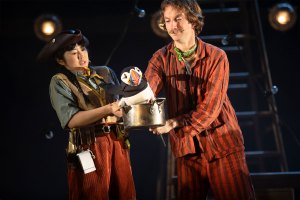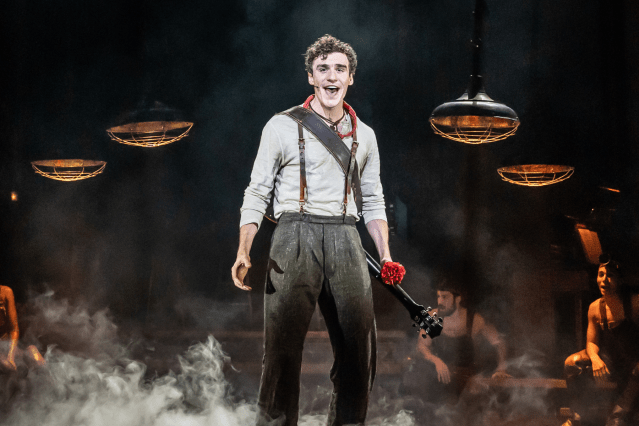The Operas of Bohuslav Martinu (1890-1959)
Anniversaries seem to be cornerstones of concert programming these days and there is a plentiful supply of composers’ birth and death days to keep concert managers busy during 2009. This year sees major anniversaries for Handel, Purcell, Haydn and Mendelssohn, so let’s hope that, in this abundance of celebrations, the 50th anniversary of Bohuslav Martinu’s death doesn’t get overlooked.
If due tribute is paid to Martinu, we’ll get a chance to hear some wonderful compositions that are not well known by large sections of the opera and concert-going public. The Czech composer was one of the most prolific of the mid twentieth century with nearly 400 works produced between the 20s and his premature death, at the age of 69, in 1959. There are six sparkling symphonies, a mass of chamber works including seven string quartets, five piano concertos and many assorted orchestral works.
Then there are the ballets, oratorios and operas. The best known of the dozen or so oratorios/cantatas are the quietly moving Field Mass and the strangely hypnotic Epic of Gilgamesh. In recent years, only one of the composer’s 14 operas have been performed at a major London house – the last one, The Greek Passion, which was finally presented at Covent Garden in its original form in 2000, and again in 2004. It is 30 years since his early opera Julietta has been performed in the capital, although a concert performance is scheduled (the first of the anniversary tributes?) at the Barbican in March 2009.
Julietta
Julietta and The Greek Passion both have their supporters among Martinu adherents as the composer’s crowning masterpiece. The truth is that both have a claim to the description and any lover of his works wouldn’t want to do without either. As with all his operas, the style and tone differ enormously – the one a surrealistic dream play, the other a deeply moving religious epic – but they both have Martinu’s instantly recognisable sound, that of a composer identifiable within a bar or two of any of his works.
Subtitled “The Book of Dreams” or “The Key to Dreams”, Julietta was written in 1937-8, at the end of the first phase of the composer’s operatic output, while he was living in Paris. Nine of the 14 operas come from this period, and 15 years were to elapse before he went back to stageworks, with the remaining five operas, written between 1952 and his death seven years later.
The libretto of Julietta is based on a play by Georges Neveux and describes an Alice-like journey through a world of dreams, a domain without memories. The music is tremendously varied, ranging from the deeply romantic to the nightmarish and downright weird. It is an enchanting work, as compelling as the magical dream you don’t want to leave when you wake up to find yourself facing the mundane reality of everyday existence.
Julietta was preceded by half a dozen operatic works, most of them of short duration; in fact, only five of the operas are full-length. Of those earliest forays into the art-form, the most engaging are The Voice of the Forest (1935) and Comedy on the Bridge (1935), both written as radio plays but also subject to frequent staging since the composer’s death. The latter was given a lively performance by students of the Guildhall School a few years ago.
Comedy on the Bridge
Based on a play by the 18th Century Czech playwright Klicpera, Comedy on the Bridge is a wonderfully dotty piece in which a disparate group of villagers find themselves trapped on the bridge that divides two warring communities. Alexandre Bis (1937), a Feydeau farce gone haywire, is also of just 40 minutes length, and is equally entertaining and tuneful.
Of the earliest operas, those written in the 20s, Les larmes du couteau (The Knife’s Tears) has been most often performed, although its inscrutable Dadaist libretto is likely to be off-putting for some people. Musically, like much of his writing from that period, it owes a huge debt to Stravinsky and Les Six. Think The Soldier’s Tale and Renard and you’ll get a good idea of its sound world.
Most of Martinu’s work flirts with the strange and off-kilter, delving into the subconscious in one way or another, and Les larmes is an extreme example of this exploration – a woman falls in love with a hanged man, Satan rides a bicycle and heads split apart, while legs and arms dance on their own.
The Miracle of Our Lady
The Miracle of Our Lady (1935-6) is a collection of four short operas – The Wise and Foolish Virgins, Mariken of Nimégue, The Nativity and Sister Pascaline – that show Martinu throwing off the French and jazz influences of his Paris years and veering towards the folk idioms of his native country. It’s something of a rag-bag of cantata-like shorter pieces and medieval morality plays, with ballet interludes, bound together by some truly inspired music which foreshadows the religious content of his final opera.
In Martinu’s later operatic period, the weirdness of his earlier works remain to some extent, less overtly surrealistic perhaps, but his influences diversify even more greatly. They range from Goldoni, Gogol, Tolstoy and the legend of Ariadne to the modern Greek novelist Nikos Kazantzakis (writer of Zorba the Greek).
Mirandolina
Mirandolina is based on Carlo Goldoni’s 1753 comedy La Locandiera (also used as the basis for an opera, and somewhat less successfully, by Antonio Salieri in 1773). It was one of the Italian playwright’s most delightful works, nestling between the commedia dell’Arte farces of his early period and the later naturalism that he pioneered up until Paris fell to the mob in 1789. Almost exactly two centuries after Goldoni’s comedy was written, Martinu captured its whimsy and lightness perfectly, using a neoclassical idiom similar to Stravinsky’s in The Rake’s Progress
Ariane
Stravinsky also comes strongly to mind with Ariane, Martinu’s take on the Ariadne/Theseus tale. With a surprisingly chirpy neo-baroque setting, reminiscent of Pulcinella, the 40-minute opera is perhaps his most delightful stage-work. He wrote it as light relief during the struggle to bring The Greek Passion into being and he knocked it off in just a month. Ariadne is a showy coloratura role, whose lament on the departure of Theseus’ fleet (seemingly from Knossos in this version) takes up the final quarter of the work. The libretto was, like Julietta, based on a play by Georges Neveux, and there’s a distinctly dreamy quality to this idiosyncratic retelling of the familiar story, with Theseus confronting the Minotaur as an aspect of himself.
The Greek Passion
The story of the evolution of his final opera The Greek Passion is long and involved. Martinu wrote the opera between 1955 and 57 and presented the score to the Royal Opera House, Covent Garden, where it was expected to be conducted by the outgoing Music Director, Rafael Kubelik. But the management cried-off and the composer went away to radically revise the work, which was then premiered in Zurich in 1961.
It was finally given its first outing in the UK, by Welsh National Opera under the direction of Charles Mackerras, in 1981. The same conductor then presented the opera in its reconstructed original (and radically different) form at Covent Garden, as one of the first productions after the major refit and closure of the house, in 2000.
It may attract the wrath of Martinu purists to say that I found this version far less effective than the better-known revision. David Pountney’s production and Stefan Lazaridis’ designs were certainly impressive (the production was critically-acclaimed and award-winning) but both the first run and the revival in 2004 failed to move this particular Martinu fan and the wonderful recording Mackerras made in Brno with the WNO principals stays in my heart and mind as the definitive version.
The Three Wishes
Les Trois Souhaits (The Three Wishes) (1929), set in a film studio, is a rambling early work with a heavily jazz-influenced score and plenty of novelty, including a large filmed section incorporated into the action. The remaining operas are The Soldier and the Dancer (1927), his earliest effort based on a Plautus comedy, A Week of Good Deeds (1929), The Theatre Beyond the Gate (1935-6), What Men Live By (1952) and The Marriage, from the Gogol play (1952).
One of the endearing characteristics of Martinu’s opera writing is his idiosyncratic, though sparing, use of the accordion, an unusual member, to say the least, of an opera orchestra. It appears with great effectiveness in a number of the works, including Les larmes du couteau, Les Trois Souhaits, Julietta and The Greek Passion.
All of Martinu’s operas re-pay the effort needed to track them down and to some extent to get to grips with his often wayward libretti. Julietta and The Greek Passion are undoubtedly the two most worthy of recommendation but, with, hopefully, a new burst of interest in the composer during his anniversary year, you are urged to sample any of his works that come your way, not just this great legacy of operatic works.
Julietta will be performed by the BBC Symphony Orchestra at the Barbican in a concert performance on 27 March 2009. Jiri Belohlávek conducts and Magdalena Kozena stars as the archetypal heroine. Tickets are available on 020 7638 8891 or www.barbican.org.uk
Garsington Opera will perform Mirandolina from 18 June 2009. Details at www.garsingtonopera.org
Guildhall School of Music and Drama will present The Marriage in a double-bill with Rossini’s La Cambiale di Matrimonio from 3 June 2009. Further information at www.gsmd.ac.uk
For details of other Martinu performances, check out www.bachtrack.com and www.martinu.cz/english/novinky.php
– Simon Thomas












